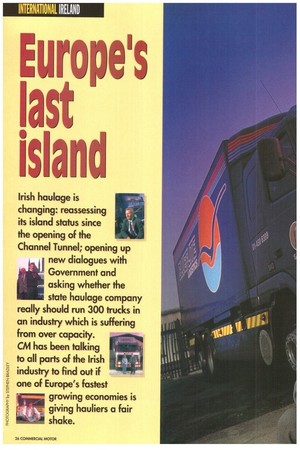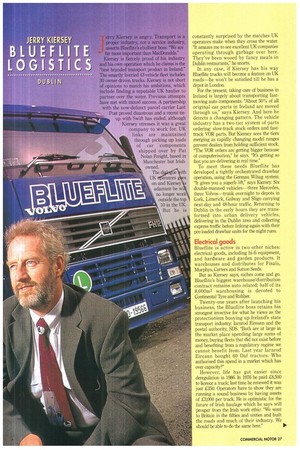la u s r t ope's
Page 28

Page 29

If you've noticed an error in this article please click here to report it so we can fix it.
island
Irish haulage is changing: reassessing its island status since the opening of the Channel Tunnel; opening up new dialogues with Government and asking whether the state haulage company really should run 300 trucks in an industry which is suffering from over capacity. CM has been talking to all parts of the Irish
_ growing economies is giving hauliers a fair shake. erry Kiersey is angry. Transport is a proper industry, not a service industry asserts Blueflite's ebullient boss: "We are far more important than MacDonalds." Kiersey is fiercely proud of his industry and his own operation which he claims is the "best branded transport product in Ireland." The smartly liveried 42-vehicle fleet includes, 30 owner-driven trucks. Kiersey is not short of opinions to match his ambitions, which include finding a reputable UK haulier to , 1 partner over the water. Previous attempts have met with mixed success. A partnership with the now-defunct parcel carrier Last Post proved disastrous and a recent tieup with Swift has ended, although Kiersey stresses it was a great company to work for. UK 4 links are maintainedli through picking up loads of car components shipped over by Pat Nolan Freight, based in Manchester but Irishowned. The e ith UK rators on and Kiersey s adamant he N I no longer work outside the top 10 in the UK. But he is constantly surprised by the matches UK operators make when they cross the water. "It amazes me to see excellent UK companies operating through garbage over here. They've been wooed by fancy meals in Dublin restaurants," he snorts. In any case, if Kiersey has his way Blueflite trucks will become a feature on UK roads—he won't be satisfied till he has a depot in London. For the present, taking care of business in Ireland is largely about transporting fastmoving auto components. "About 50% of all original car parts in Ireland are moved through us," says Kiersey. And here he detects a changing pattern. The vehicle industry has a two-tier system of parts ordering: slow-track stock orders and fasttrack VOR parts. But Kiersey sees the tiers merging as rapidly changing model ranges prevent dealers from holding sufficient stock. "The VOR orders are getting bigger because of computerisation," he says. "It's getting so fast you are delivering in real time." To meet these needs Blueflite has developed a tightly orchestrated drawbar operation, using the German Wihag system. "It gives you a superb lift," says Mersey. Six double-manned vehicles—three Mercedes, three Volvos—trunk overnight to depots in Cork, Limerick, Galway and Sligo carrying next-day and 48-hour traffic. Returning to Dublin in the early hours they are transformed into urban delivery vehicles, delivering in the Dublin area and collecting express traffic before linking again with their pre-loaded drawbar units for the night runs. Electrical goods Blueflite is active in two other niches: electrical goods, including hi-fi equipment, and hardware and garden products. It warehouses and distributes for Fisals, Murphys, Carters and Sutton Seeds. But as Kiersey says, niches come and go. Blueflite's biggest warehouse/distribution contract remains auto related; half of its 8,000m2 warehousing is devoted to Continental Tyre and Rubber. Twenty-one years after launching his business, the Blueflite boss retains his strongest invective for what he views as the protectionism buoying up Ireland's state transport industry: larnrod Eireann and the postal authority SDS. "Both are at large in the market place spending large sums of money, buying fleets that did not exist before and benefiting from a regulatory regime we cannot benefit from. Last year Iarnrod Eireann bought 60 Daf tractors. Who authorised this spend in a market which has over capacity?" However, life has got easier since deregulation in 1986. In 1976 he paid £8,500 to licence a truck; last time he renewed it was just £350. Operators have to show they are running a sound business by having assets of £3,000 per truck. He is optimistic for the future of Irish haulage which he says will Prosper from the Irish work ethic: "We went to Britain in the fifties and sixties and built the roads and much of their industry. We should be able to do the same here."
















































































































